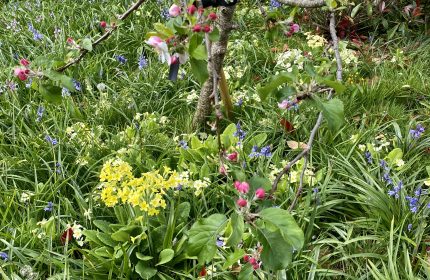Don’t Let the Music Stop!
From Zero to Music Hero by the End of Lockdown
Everyday life has changed quite dramatically. We are all trying to adjust to the new normal and carving out a new routine. Playing a musical instrument is an uplifting way to keep your body and mind active.
People of any age can learn to play music and, given today’s longer lifespans, it’s a safe bet that if you start playing an instrument in later life, you can keep on playing and progressing for decades, whichever instrument you choose. Older returners invariably describe an incredible sense of re-discovery, a sense of release and forgotten joy when learning and playing.
Playing a musical instrument in retirement, even a little, helps you stay mentally and physically agile. Additionally, there have been many research studies that show playing an instrument can enhance emotional well-being, brain health, cognition and hearing function.
Commit to just a few minutes practice a day and imagine how much you could achieve by the end of Lockdown! You could surprise family and friends with your new found skills or put on an impromptu performance! Set aside a regular time each day to develop and improve your technique. You will find learning to love music and being happy and confident when you are playing is a great reward in itself.
Get ‘Appy
There are some great online apps around and there are Yamaha instruments with built-in training functions to help you develop as a musician. For example, the Yamaha DTX432K Electronic Drum Kit provides beginner drummers with an entry-level kit that will improve drumming skills and techniques while introducing intuitive, app-driven challenges and rewards to encourage them to keep playing.

Man Learning To Play Piano Using Digital Tablet Application
5 Tips to set up for music success
1) Practice Little & Often
The thought of having to practice for hours on end every day would put most of us off before we’ve even picked up an instrument. So how long do you actually need to practice for – and how often should you do it?
Psychologists have a wealth of research that shows how our concentration changes over time. For most of us, we’re happy and able to pay attention for up to 18 minutes before we tune out. Imagine what you could achieve if you invest just 18 minutes of your time every day to practice?
It takes commitment – the effects of practicing tend to be partially cumulative so missing days can hold you back; instead develop a consistent habit even if some days you feel that you can only manage a few minutes to play.
How long do the greats practice for?
Most of history’s greatest musicians spent their lives practicing and performing. Dizzy Gillespie, the famous jazz saxophonist, practiced for twelve hours a day for many years whilst guitar legend Jimi Hendrix was said never to have put down his guitar – even taking it with him to the bathroom! Likewise, concert pianists will regularly practice for at least 5 hours every day (increasing that time when preparing for a performance).
If you’re a full-time, professional musician, you’re probably doing all of the above already. For the rest of us, those extremes aren’t necessary but you do have to put the time in and be prepared to practice daily even for a few minutes.
2) Create a Music Sanctuary
It’s important to have your own space to practice, where you feel comfortable and are able to focus. Find a spot, a corner under the stairs, your bedroom or garage; it doesn’t matter where, as long as it is away from distractions so that you can totally concentrate on playing. Having the routine of going to the same place every time also helps you find the right mindset.
Wherever you choose, it needs to be a place that’s safe to leave your instrument ready to play (or ready to assemble quickly) so you can get straight to practicing. The area also needs to be well-ventilated and well-lit; if you play sitting down, find a chair or stool (ideally with an adjustable height) and ideally a sturdy music stand (that doesn’t wobble of fall over when you’re writing notes).
Have everything you need close to hand; water to drink, paper & pencil to make notes with, a clock (or watch), a tuner, a metronome and your music within arms reach. All these things are easy to misplace and it can easily take up your entire practice time searching for them. If you don’t have a tuner or metronome but do have a smartphone or tablet, there’s a variety of free and low-cost apps you can use instead.
Distractions are the nemesis of the practicing musician. Make sure your practice room is free of them – no TV, no laptop and only a phone or tablet if you need them for time keeping or practice-aid apps.
3) SSSSSHHH!! Silent Technology
Yamaha award-winning Silent Technology allows brass players, drummers, violinists, pianists, keyboard players and guitarists of all levels to practice almost anywhere, at anytime – without disturbing those around you. Instruments can be played almost silently using headphones – and although the acoustic sound to the outside world may be barely a whisper, you’ll hear a completely natural and normal sound via the headphones.
4) Get into Practice-Ready Shape
Just as with a physical workout, a warm-up before practicing music is essential. It prepares your muscles, making your hands and fingers more flexible and crucially reduces the danger of any strains. It also helps you to practice specific techniques and fingering which directly benefits the music you’ll be playing. You wouldn’t run a marathon without stretching first, and the same principle applies to playing an instrument. Veteran musicians invariably bookend their playing with warm-ups (and breathing exercises for brass and woodwind players) and cool-downs.
It would be very tedious if you plough through the same warm up every day; your mind will wander before you’ve even started practicing. First of all, prepare your body and mind for work and take notice of how you’re feeling. Take a few deep breaths to calm and centre yourself, be aware of any tension in your body and tell your body to relax. Remind yourself of the day’s goal either silently in your head, or state it out loud.
5 to 10 minutes of warm up is plenty of time when you’re a beginner. Whether playing scales or practicing instrument keying, warming up will get your muscles moving but also reinforce and strengthen your technique.
Don’t always play the same scales and do try mixing in basic sight reading. Playing the scales of the key signatures your pieces are in will help connect your warm-up directly to your practice, whilst technical studies such as pentascales for piano or long bowing for stringed instruments will help loosen fingers and joints.
If you start developing aches and pains, listen to your body. Does your back hurt every time you sit down to practice? If so, check your posture and chair but don’t put off seeing a specialist if the pain doesn’t subside. Are you straining to read the music sheet in front of you? Optical vision issues are usually easily corrected by a trip to your local optician. If you’re having trouble hearing the difference in pitches or tones, a hearing test could be just as valuable. Listen to your body if something doesn’t feel quite right
5) Goals & Objectives
Before you even get to your music sanctuary, ask yourself – “what do I want to accomplish today?” Do you want to memorise a piece of music? Do you need to work on breath stamina? If start practice with a goal in mind, you will be focused, motivated and more likely to achieve it.
Break each goal down into smaller, focused objectives. When a piece is proving troublesome, practice it in short sections, line by line or phrase by phrase. The brain learns and remembers small chunks of music and the playing context around it more easily than it does a full piece. Take it slowly, gradually increasing tempo over the space of a week (you’ll likely find you do this anyway). And, if you’ve been working for a long time on a problematic section without making any apparent headway, try coming back to it tomorrow – the chances are you’ll find it much easier.
In a music journal or practice notes, write down your goals and keep them in mind when you practice each day. At the end of each session, keep a note of how much nearer you are to reaching those goals. A music journal is a great way to write down any frustrations, record your successes and, of course, to track your progress.
To see the huge ranges of Yamaha instruments and accessories available visit www.yamahamusiclondon.com .
There’s a team of Yamaha music experts ready to take your call. For advice or to place an order please call 0207432 4400



















